So, you’re a mom who loves your children and you want to take better pictures of them. You’re pretty sure this means you need a better camera, but there are so many options out there that you don’t even know where to begin.
You’re pretty sure you need a DSLR, but which one? Nikon or Canon? And what lens is best?
The answer to all of these questions is, of course, it depends.
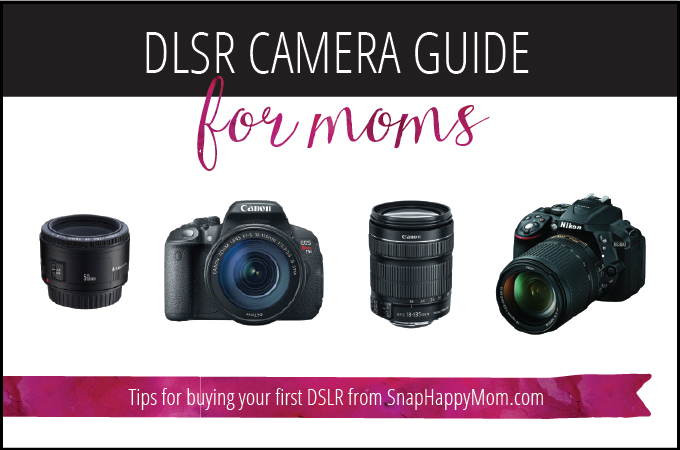
It will absolutely depend on your personal preference, your budget, what you like to shoot, where you shoot, and how committed you are to improving your skills. And I have recommendations for you!
In general, using a DSLR is the best way to take better pictures: not because the camera itself can magically take better photos, but because a DSLR gives you the ability to control the things that are going to make the biggest difference in your photography.
It will be able to freeze motion, which is obviously a big deal for photographing children, and using the right lens on a DSLR allows you to choose what is in focus and what is not, which one of the best ways to create a pleasing portrait. It also has a larger sensor, which means your images can be sharper, more detailed, and higher quality than anything a point and shoot can produce.
Have you ever felt like you wanted to take a picture a certain way and your camera wouldn’t let you? It wouldn’t focus where you told it to, or the picture didn’t look like what you imagined? These are signs you’ve outgrown a compact camera and should consider moving up to a DSLR.
That doesn’t mean you have to buy a new camera this instant, but it does mean that you want to be more creative than your camera is allowing. Why would you keep using a tool that limits you?
Now there are two things you should know right now:
First, you need to be in at least the $500-700 price range to get a new DSLR camera. You may be able to find used gear for less, but if you’re buying new, that’s the price. Start saving your pennies, because a DSLR is an investment, but it’s an absolutely worthwhile investment.
Second, you need to recognize that a DSLR is a creative tool, not a magical fix for your photos. There is a learning curve, and your pictures will not look amazing if you stay on automatic all the time.
A DSLR will produce sharper pictures, even on automatic, but at some point, you’re going to have to learn how to use that expensive camera if you want to take the pictures of your dreams. You can absolutely capture the wonder and magic of childhood, but you’re going to get out of this what you put into it.
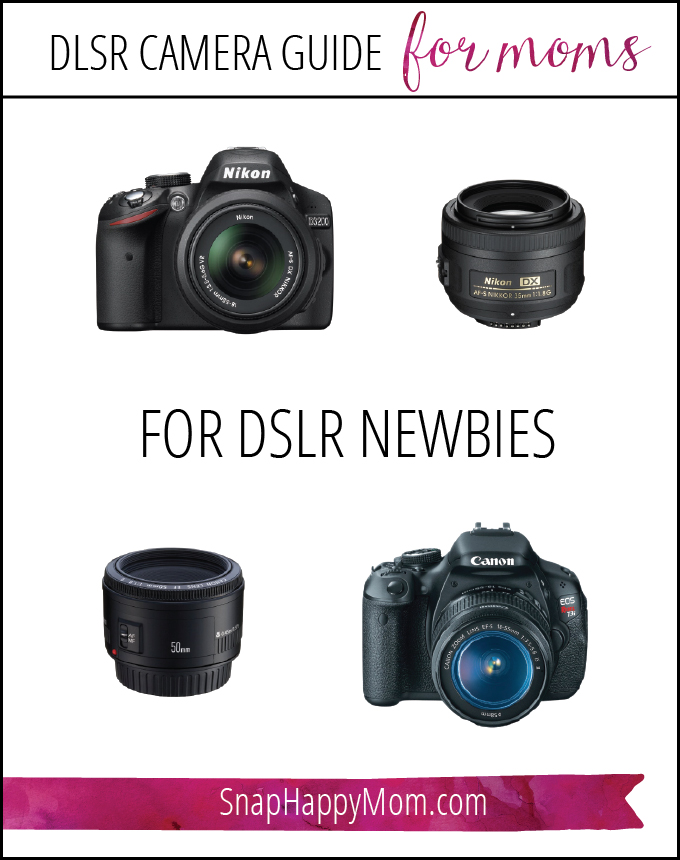
CAMERA RECOMMENDATIONS FOR DSLR NEWBIES
Beginning DSLR Users
Price Range: $500-700
If you are a beginner in the DSLR world and have no idea what aperture or shutter speed is, I suggest you start here. Get a camera that has automatic mode and some good scene settings.
Your pictures will be noticeably better, mostly because they’ll be sharper and have more contrast than what your point and shoot could capture. They won’t be fantastic, but that’s because you’re not really using your camera’s full abilities yet. When you’re ready, explore aperture mode, and work your way into shooting in full manual.
Here are the two cameras I recommend for complete DSLR beginners: the Nikon D3400 or the Canon T7 (also known as EOS 2000D).
At this level, the brands don’t matter because the cameras are essentially the same, and you will not see a noticeable difference between the abilities of these two cameras.
You can absolutely get some beautiful pictures out of these basic cameras. These cameras are for people who want to take better pictures but aren’t sure if they are going to love a DSLR yet. (Trust me, you will).
Nikon D3400 with the 18-55mm lens
Canon Rebel T7 with the 18-55mm lens

If you have any desire to take pictures inside your house—and let’s face it, your kids will be cute inside too—then you simply must get yourself a lens that can handle indoor lighting! Plan the cost of a fast prime lens into your initial camera purchase. You won't regret it!
These two lenses are STEALS at these prices and will make the biggest difference in your photography as a beginner and motivate you to improve. They are called “prime” lenses, and won't zoom at all, but they will let in tons more light.
Get this one if you have a Nikon: 35mm f/1.8G Lens.
Get this one if you have a Canon: 50mm f/1.8 Lens.
It's SO worthwhile to get a fast prime as a beginner!
It might be an option to get the camera model that is was replaced by the newest model. Often this is cheaper since it's not the "latest and greatest," but sometimes it's more expensive if there are inventory shortages.
The model older than the D3400 is the D3300, which is decent. Canon's T6i is nearly identical to the T7 as well.
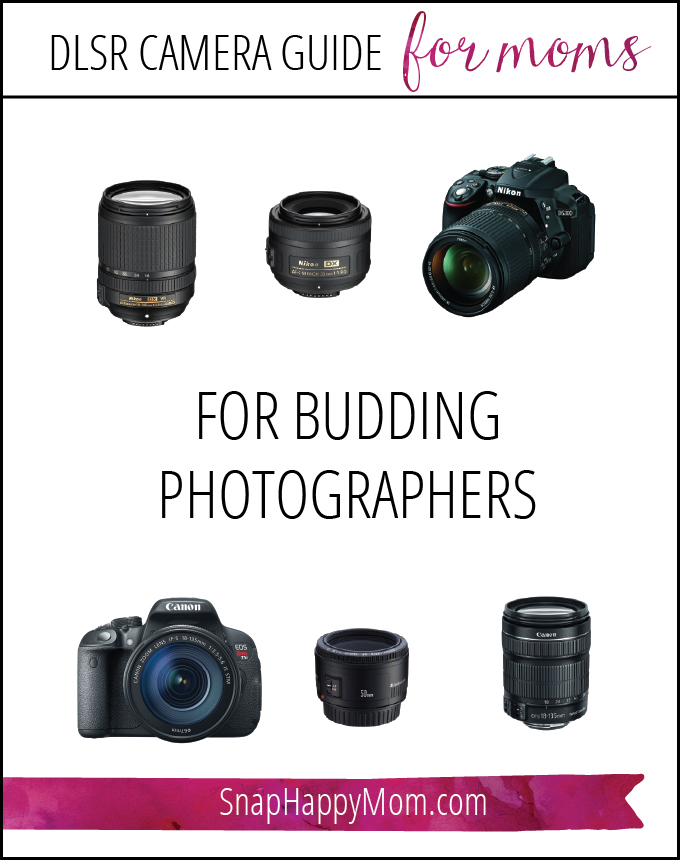
DSLRs FOR BUDDING PHOTOGRAPHERS
Upper Entry-Level Users
Price Range: $700-1100
If you’re coming into the DSLR world with a bit of knowledge about cameras and how to use them, you will get frustrated with a beginning camera and kit lens quite quickly.
The entry-level DSLRs do not make it easy to shoot in full manual; most lack dedicated aperture and shutter speed controls, and force you to go through the menus to make adjustments. This makes it hard to truly master manual mode, and limits your abilities to change things on the fly when your kids are running around.
Basically, going "one-step up" in the camera world is almost certainly worthwhile for usability.
So, if you have a little more money to spend, and you’re committed to improving your skills, you’re going to be happier with a camera that can do more. I would buy a slightly nicer camera body, and spend your money on nicer lenses, starting with the longer kit lens and a fast prime.
Nikon D5600, with the 18-140mm lens if you can, plus the 35mm f/1.8G lens
Canon 80D, optionally upgrade to the 18-135 lens, but definitely get the 50mm f/1.8 lens
(You can also consider getting last year's model of the above cameras. Sometimes this is cheaper, but sometimes it's not because of less inventory. In this case, you would be looking at the Nikon D5500 or the Canon 70D.)
MY PHILOSOPHY ON CAMERA GEAR
DSLR is a broad term for a whole continuum of camera levels. There are beginner/entry-level DSLRs with certain features, and then professional level DSLRs with more advanced features and a price to match. If you’re coming into the DSLR world as a complete beginner, then you absolutely need to get a basic DSLR and learn how to use it.
My philosophy is to buy gear you can afford, and move up when you grow out of it. So I’m not going to tell you to go get a several-thousand-dollar camera. I don’t want that beautiful camera to sit on your shelf and not get used because it was too advanced.
You’ll know when you’re growing out of the camera you own. You’ll realize you want to do more than your camera is letting you do, and THAT’s when you trade up.
If you take care of your equipment, you can absolutely retain the resale value of your lenses, and most of the value of your camera body. Too many people jump into a more advanced camera thinking it will get them better pictures when they just need to push their equipment and make the most of its ability.
So, I suggest you decide what you can afford within the entry-level cameras and learn how to use that camera.
You can also buy many cameras that are used or certified refurbished. Photographers often resell their cameras after they upgrade, and cameras do retain their value if they have been taken care of.
WHAT TO DO IF A DSLR DOESN'T SOUND RIGHT FOR YOU.
Does this sound totally complicated and overwhelming? There are lots of reasons not to get a DSLR. They’re big. They’re heavy. They have a bunch of buttons that seem overwhelming at first. You might be thinking you’re just too busy to learn how to use it right now. That’s totally fine.
IF you're not going to buy a DSLR, get a good compact camera.
Not a point and shoot, but a good small camera that you can take with you. It’s not worth getting a DSLR if you’re going to leave it auto all the time, or worse, leave it in the bag because you’re not committed to using it.
Instead, go for the Sony HX80V. You can read more about these cameras and the other small cameras I recommend in the Snap Happy Mom Camera Guide For Compact Cameras.


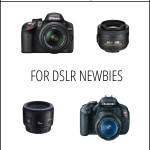
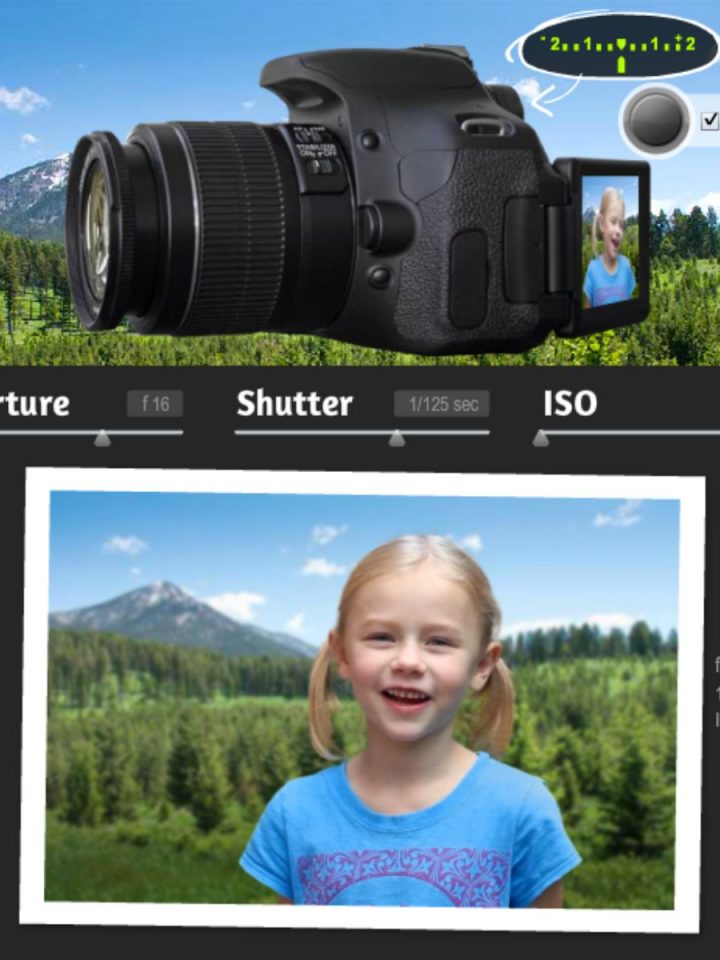
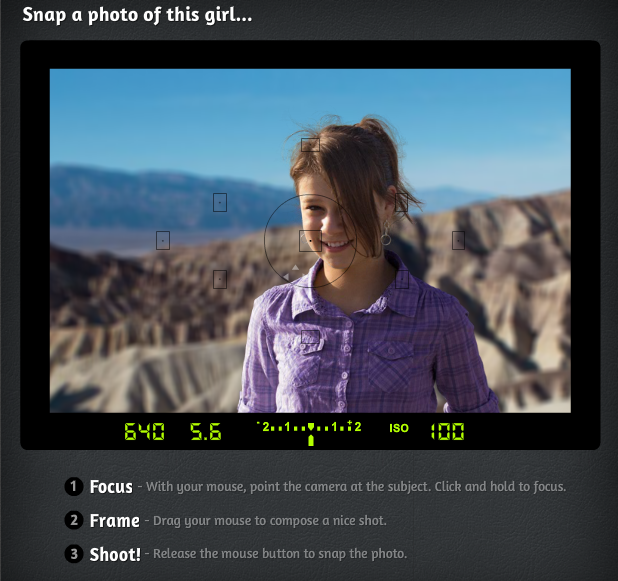
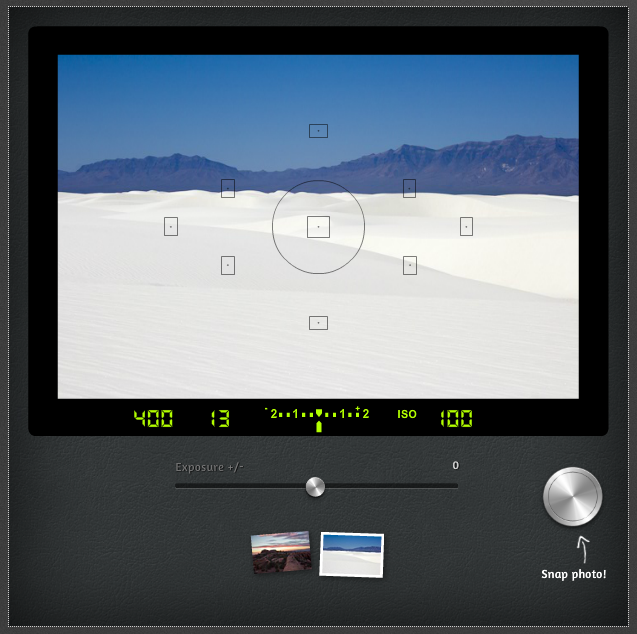
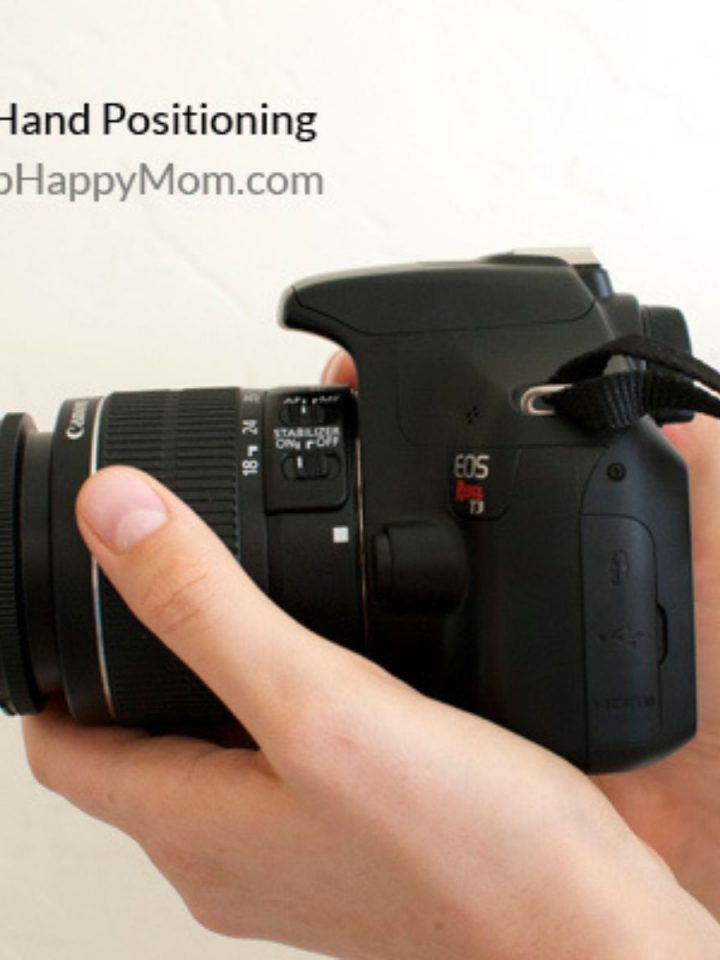
Courtney @ I Watch Them Grow says
Meg I pretty much could have written this -- totally agree! I got my first DSLR (Nikon 3100) after years of being frustrated with pint and shoots. Then as I loved the quality and didn't want to miss any shots trying to figure out manual, I spent a year and half shooting in Sport mode (fast shutter no flash) lol. With fast prime 35mm and 50mm lenses.
But last year I resolved to learn manual so I switched the dial, read a couple books and some extremely helpful posts on clickitupanotch.com and never turned back. The prime lenses really help learn manual too because they don't change aperture as you shoot like a zoom lens does.
Also wanted to say that my camera does have buttons for all the manual settings no menu required except for white balance. Anyways sorry for the novel of a comment, great post Meg this will really help new mom photographers!
Meg says
Thanks so much for commenting- I'm so glad you've figured out your camera! It can take a long time, but it's worth learning, isn't it?
Courtney @ I Watch Them Grow says
Absolutely worth it! My photos have come a long way and it's becoming intuitive. I'm less frustrated but still eager to improve my speed and creativity. Also wish I could upgrade to a full frame sensor but I'll have to wear this one out before hubby agrees to that 🙂
Suresh Kumar says
Good :)I just got my first SLR, the Pentax K-50 and I'm very very very lost. I passed the phone to "this" and helps me a lot to read you.
As soon as the flash issue I have only found related to Canon and Nikon. A greeting.
http://www.thephototoday.in
MichelleBurias Mejia says
Thank you very much people
Ajex says
I recommend the Nikon D3200
Richard Gaspari says
I'd recommend the D3200 for beginners as well, especially since it's come down in price so much since it's release. As a beginner especially you're not going to notice much difference between the D3200 and, say, the more expensive D3400, so you might as well save a bit of money while getting a camera that's going to do everything you want it to do and more.
Shane says
I've seen some (what appear to be) pretty nice DSLRs in the $350-$500 range, but you say to start at $500 as a baseline... is there something I should know about these cheaper DSLRs?
Heather says
I recently saw this camera bundle for $499 on Amazon. However it is a canon T6 not t6i. Can anyone give my any advice as to whether or not this is a good idea? I would like use the camera to take nice pictures of my kids. Like she mentioned in the article something more than just a point and shoot. HELP!!!
Canon EOS Rebel T6 Digital SLR Camera + Canon 18-55mm EF-S f/3.5-5.6 IS II Lens & EF 75-300mm f/4-5.6 III Lens + Wide Angle Lens + 58mm 2x Lens + Slave Flash + 64GB Memory Card + Wired Remote + Bundle https://www.amazon.com/dp/B01DAW28X6/ref=cm_sw_r_cp_apa_f8LSBb019SE25
rrthoranammahal says
To be able to master the manual mode and use it completely independently, you can use the trick of observing the behavior of the camera itself in automatic or semi- manual mode .
Put your camera in automatic mode, frame and focus on a low-light area, observe the aperture and shutter speed settings that the camera automatically chooses. Finally shoot.
Repeat the test again, but this time framing a lighter area, and compare the settings that the camera has decided this time with the previous time.
The manufacturers of SLR cameras, when setting up the automatic mode, strive to program the automatic mode with the same logic that governs the manual mode. The principle is the same. You, as an apprentice photographer, can rely on that "programmed" behavior to draw conclusions about the basic rules of how to use manual mode. Obviously, once you have learned the basic principle, you can deviate from it and innovate everything you want.
Irich Photography says
Thanks for sharing
Camera accessories price in pakistan says
Every mom don't know how to use camera mom want to easy to use camera for her mom need to guide about that i suggest to you made a application for mom
krish says
Thanks for your valuable information. Keep more ideas.
kamal says
Thanks for your valuable information
Mahendran says
Very good contribution, the truth that one needs being an amateur or beginner someone who is sincere and objective. It helped me a lot! I appreciate your time spent on this.
Irich Photography says
Would appreciate in time spent of giving useful information
Irich photography says
Very valuable post
Lavante globale says
Good content
Stills karthick says
Loved the article!